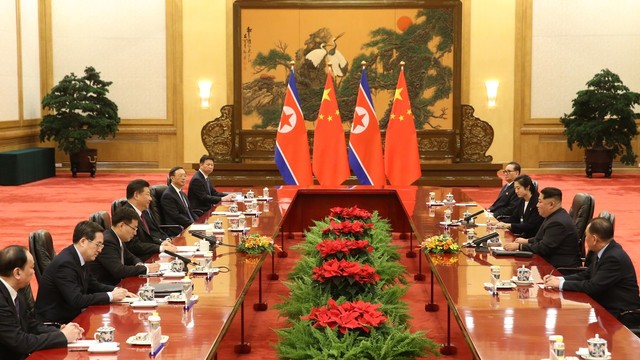 |
|
Chinese President Xi Jinping holds a summit with North Korean leader Kim Jong-un at the Great Hall of the People in Beijing on Mar. 26. The photo was issued by Chinese state-run media on Mar. 28. (Xinhua)
|
China will need to play a key role in resolving the North Korean nuclear issue
The Blue House has been busy since a recent surprise summit in Beijing between North Korean leader Kim Jong-un and Chinese President Xi Jinping. Returning on the morning of Mar. 28 from visits to Vietnam and the United Arab Emirates, President Moon Jae-in immediately received a briefing on the summit from Blue House National Security Office director Chung Eui-yong and other advisors and discussed its potential impact on planned inter-Korean and North Korea-US summits in late April and May. Moon reportedly predicted the dialogue between the North Korean and Chinese leaders would have a positive impact on the two upcoming meetings. With the North Korea-China summit happening so suddenly, the Blue House appears likely to conduct a close examination of Pyongyang’s aims and Beijing’s strategy before presenting an official position. “The situation that has transpired to date has exceeded our expectations. We’re going to have to consider every possibility as we observe things going ahead,” a senior Blue House official told reporters that day. “The Blue House’s official statement on the North Korea-China summit will probably come after [Chinese Communist Party Central Committee Political Bureau member] Yang Jiechi visits South Korea on Mar. 29 for discussions,” the official predicted. The Blue House also shared that it was aware of the summit beforehand, stressing the importance of continued cooperation with China. “President Moon received report on major details of the North Korea-China summit while visiting the UAE,” the official said. “We were observing closely from the time [Kim Jong-un’s] train departed [North Korea], and there were close discussions among senior South Korean and Chinese officials,” the official added. In a statement in the name of Ministry of Foreign Affairs spokesperson Noh Kyu-duk, the administration said that it welcomes Kim’s China visit and the summit between Pyongyang and Beijing. “The administration welcomes North Korean Chairman Kim Jong-un’s visit to China on Mar. 25–28 for talks with Chinese leaders,” Noh said in the statement. Noh also wrote that the administration “looks forward to Kim’s visit contributing to denuclearization and establishment of peace on the Korean Peninsula, coming as it did ahead of the inter-Korean and North Korea-US summits.” The Moon administration largely sees the summit as a positive development, as it means China is no longer excluded as one of the key parties to Korean Peninsula issues. But with some suggesting China’s presence may have added further complications to the North Korean denuclearization formula, relevant government agencies were reported that day to be closely analyzing North Korean and Chinese media reports on the content and messages communicated by the two leaders. A “step-by-step, coordinated” approach to denuclearization The Ministry of Foreign Affairs, which will be responsible for direct denuclearization talks going ahead, focused in particular on Kim’s reference to “gradual, simultaneous measures” from Seoul and Washington in connection with the denuclearization issue. Analysts suggested the remarks – which echo the “coordinated steps” in a “phased manner in line with the principle of ‘commitment for commitment, action for action’” mentioned in the September 19 Joint Statement issued after the fourth round of Six-Party Talks in 2005 – mean North Korea intends to adopt a step-by-step approach to denuclearization. In developing its response measures, the ministry is reviewing past denuclearization talks and considering different scenarios amid the new situation following North Korea’s advancements in nuclear and missile development. Meanwhile, Blue House chief of staff and inter-Korean summit preparatory committee chairman Im Jong-seok presided over a meeting of subcommittee chairs the same afternoon to prepare for high-level talks at Panmunjeom on Mar. 29 for the 2018 inter-Korean summit. The preparatory committee announced a final list of 46 advisers, consisting of a 21-member “veteran advisory group” – including former Unification Ministers Lim Dong-won, Han Wan-sang, Jeong Se-hyun, Chung Dong-young, and Lee Jong-seok; Party for Democracy and Peace lawmaker Park Jie-won; special presidential advisor on unification, foreign affairs, and national security Moon Chung-in; and JoongAng Ilbo journalist Kim Young-hee – and a 25-member “expert advisory group” including professors Kim Kwi-ok, Kim Yeon-cheol, Park Myung-lim, and Yang Moo-jin and Institute for National Security Strategy senior research fellow Cho Sung-ryul. By Kim Bo-hyeop and Kim Ji-eun, staff reporters Please direct questions or comments to [english@hani.co.kr]






